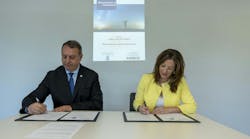San Francisco International Airport (SFO) is the first airport in the United States to launch a Centers for Disease Control and Prevention (CDC) program to continuously monitor airplane wastewater samples from the onsite triturator for variants of SARS-CoV-2, the virus that causes COVID-19. CDC’s partner in administering the program, Concentric by Ginkgo, the biosecurity and public health unit of Boston-based synthetic biology company Ginkgo Bioworks, has installed an automatic sampling device that regularly collects combined wastewater flows from international arriving flights at SFO. These samples are then sent to an approved laboratory for testing.
“We are proud to be the first airport to launch this pilot program with CDC,” said SFO Airport Director Ivar C. Satero. “Throughout the pandemic, SFO led the way in enhanced screening, onsite vaccination, and surveillance programs. This latest effort represents the most targeted approach to identify, monitor, and ultimately mitigate COVID-19 variants.”
“As we know from the COVID-19 pandemic, pathogens can spread quickly across the globe, impacting travel and trade", said Dr. Cindy Friedman, Chief of CDC's Travelers' Health Branch. "Testing of airplane wastewater can provide early detection of new COVID-19 variants and other pathogens that can cause outbreaks and pandemics. CDC appreciates the collaboration with SFO to further enhance these efforts."
This is not the first time SFO has been involved in a wastewater collection program. SFO had previously supplied wastewater samples from its treatment plant to the University of California – San Francisco Medical Center to identify new COVID-19 variants. This latest program will be limited to wastewater samples from the International Terminal.
“Biology doesn’t respect borders, and airports and other ports of entry are critical nodes for monitoring the spread of pathogens,” said Matt McKnight, General Manager, Biosecurity at Ginkgo Bioworks. “We are proud to partner with SFO on developing cutting-edge biosecurity technology to support public health.”

